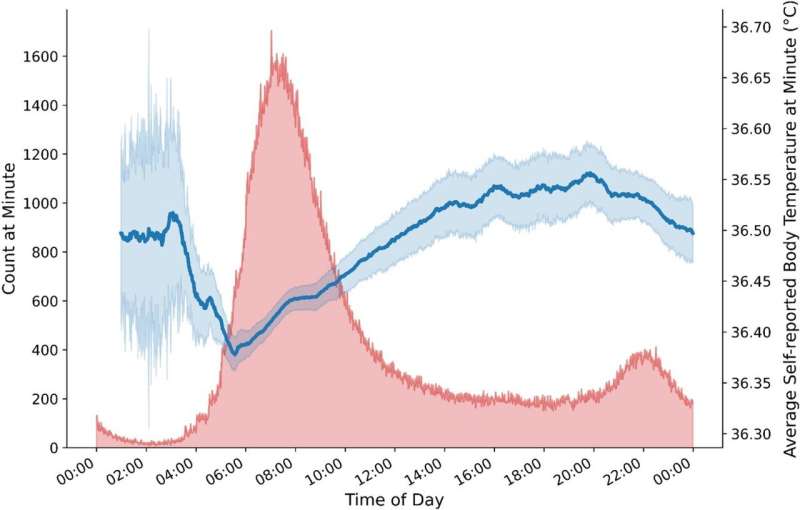This article has been reviewed according to Science X's editorial process and policies. Editors have highlighted the following attributes while ensuring the content's credibility:
fact-checked
trusted source
proofread
Are body temperature and depression linked? New study says, yes

People with depression have higher body temperatures, suggesting there could be a mental health benefit to lowering the temperatures of those with the disorder, a new UC San Francisco-led study found.
The study, published today in Scientific Reports, doesn't indicate whether depression raises body temperature or a higher temperature causes depression. It's also unknown whether the higher body temperature observed in people with depression reflects decreased ability to self-cool, increased generation of heat from metabolic processes or a combination of both.
Researchers analyzed data from more than 20,000 international participants who wore a device that measures body temperature, and also self-reported their body temperatures and depression symptoms daily. The seven-month study began in early 2020 and included data from 106 countries.
The results showed that with each increasing level of depression symptom severity, participants had higher body temperatures. The body temperature data also showed a trend toward higher depression scores in people whose temperatures had less fluctuation throughout a 24-hour period, but this finding didn't reach significance.
The findings shed light on how a novel depression treatment method might work, said Ashley Mason, Ph.D., the study's lead author and associate professor of psychiatry at UCSF Weill Institute for Neurosciences. A small body of existing, causal studies has found that using hot tubs or saunas can reduce depression, possibly by triggering the body to self-cool, for example, through sweating.

"Ironically, heating people up actually can lead to rebound body temperature lowering that lasts longer than simply cooling people down directly, as through an ice bath," said Mason, who is also a clinical psychologist at the UCSF Osher Center for Integrative Health. "What if we can track the body temperature of people with depression to time heat-based treatments well?"
"To our knowledge, this is the largest study to date to examine the association between body temperature—assessed using both self-report methods and wearable sensors—and depressive symptoms in a geographically broad sample," added Mason. "Given the climbing rates of depression in the United States, we're excited by the possibilities of a new avenue for treatment."
More information: Ashley E. Mason et al, Elevated body temperature is associated with depressive symptoms: results from the TemPredict Study, Scientific Reports (2024). DOI: 10.1038/s41598-024-51567-w


















